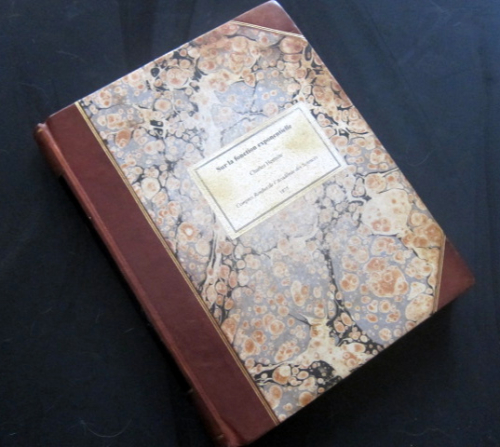 Charles Hermite, “Sur la fonction exponentielle”, a five-part paper in Comptes Rendus Hebdomadaires des Seances de l'Academie des Sciences, 1873, vol 77, Nos 1-5, 380pp, (with the Hermite paper in issues 1,2,4,5).
Charles Hermite, “Sur la fonction exponentielle”, a five-part paper in Comptes Rendus Hebdomadaires des Seances de l'Academie des Sciences, 1873, vol 77, Nos 1-5, 380pp, (with the Hermite paper in issues 1,2,4,5).
Paris: Gauthier-Villars, 1873. The Hermite papers occupy pp.18-24, 74-79, 226-233, and 285-293.
The five issues are rebound in a finely executed half-calf and marbled boards binding, with an antiqued paper label on the front board; new end papers. Lovely binding. The text is crisp though there is some browning (not making the paper brittle by any means). The paper label on the front board is misprinted as “1875” instead of “1873”. Fine copy. $950
- First appearance of Hermite's very important work on the transcendence of e. “1873. Charles Hermite (1822-1901) proves that the base of natural logarithms, e = 2.718...is transcendental. This is the first familiar number to be transcendental.”--Parkinson, Breakthroughs, a Chronology of Great Achievements in Science and Mathematics.
“One of the best-known facts about Hermite is that he first proved the transcendence of e (1873). In a sense this last is paradiematic of all of Hermite’s discoveries. By a slight adaptation of Hermite’s proof, Felix Lindemann, in 1882, obtained the much more exciting transcendence of π. Thus, Lindemann, a mediocre mathematician, became even more famous than Hermite for a discovery for which Hermite had laid all the groundwork and that he had come within a gnat’s eye of making. If Hermite’s work were scrutinized more closely, one might find more instances of Hermitean preludes to important discoveries by others, since it was his habit to disseminate his knowledge lavishly in correspondence, in his courses, and in short notes. ...Hermite’s most important results have been so solidly incorporated into more general structures and so intensely absorbed by more profound thought that they are never attributed to him. Hermite’s principle, for example, famous in the nineteenth century, has been forgotten as a special case of the Riemann-Roch theorem. Hermite’s work exerted a strong influence in his own time, but in the twentieth century a few historians, at most, will have cast a glance at it.”--by Hans Feudenthal, Complete Dictionary of Scientific Biography (online)



Comments